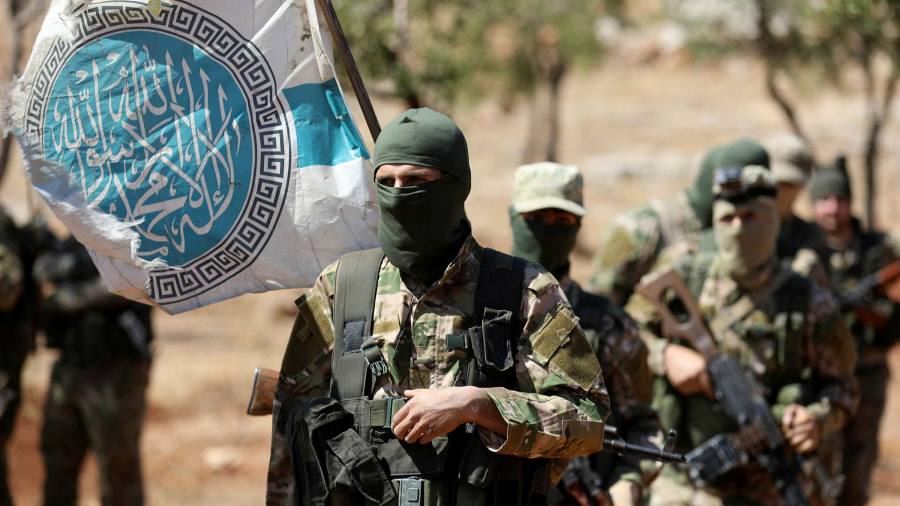[ad_1]
Once synonymous with combat fatigues and weapons, Abu Mohammad al-Jolani has undergone an image change, with the Syrian jihadi this month photographed wearing a western-style business suit.
Jolani is the commander of Hayat Tahrir al-Sham (HTS), the Islamist militants that rules the northwestern region of Idlib, the final bastion of revolutionary opposition to President Bashar al-Assad of Syria after nearly a decade of civil war.
His wardrobe transformation is part of a deliberate rebranding by the group, designated a terrorist organisation by the US and Turkey, as the most powerful Islamist militants in Syria since Isis try to secure a political future for themselves.
Jolani was for many the face of notorious al-Qaeda affiliate Jabhat al-Nusra, since merged into HTS and no longer formally connected to al-Qaeda. HTS wants to convince the international community that Idlib is not — as a US official once called it — “the largest al-Qaeda safe haven since 9/11â€.
“They know that’s their only chance for survival . . . to become . . . more moderate . . . more palatable to Turkey and the international community,†said a European diplomat in Beirut.
Navvar Shaban, an analyst at Istanbul think-tank Omran Centre for Strategic Studies, described the rebranding as a “PR campaign showing they’re more willing to have some kind of international negotiation with everyoneâ€.
This month International Crisis Group urged Washington to seek ways for the group to prove itself a legitimate partner and eventually “shed its ‘terrorist’ labelâ€. It argues that the label undermines the ceasefire between Russia, which backs Assad, and Turkey, which supports the opposition, that followed a regime advance on Idlib last year.
HTS seized control in Idlib nearly two years ago after “literally crush[ing] any competing oppositionâ€, according to Dareen Khalifa, senior analyst at International Crisis Group.
Thought to have up to 10,000 fighters, the group has since then become Syria’s dominant jihadist force, “de facto control[ling] more territory than [Isis]â€, said Aymenn Jawad al-Tamimi, research fellow at George Washington University’s programme on extremism.
Jolani has taken a different tack from Isis, whose global terrorist attacks instigated from its territories inside Syria and Iraq and the brutality of its self-declared caliphate sparked international outrage and a global effort to crush the extremists.
Rather than launching international terrorism or creating an Islamic emirate, HTS’s military efforts “have always been solely focused on bringing down the Syrian governmentâ€, senior HTS official Abu Abdullah al-Shami said last year. Jolani, a US-designated terrorist, fell out with former ally Isis and later broke Jabhat al-Nusra away from al-Qaeda.
Under its control the region “looks like a conservative, Islamist society which is undemocraticâ€, said Khalifa. “But it doesn’t look like a lawless area controlled by a militia.†On a recent visit, Khalifa said, she had noticed that walls carrying jihadi slogans had been whitewashed over.
The group has not enforced strict religious rules in Idlib. Women are not forced to cover their faces and people are allowed to smoke. It has even allowed an investor to spend $300,000 building an entertainment complex named after a quintessentially American brand — Disneyland.
Unlike Isis, HTS does not micromanage daily life. It has outsourced the region’s administration to a local civilian-led “Syrian Salvation Government†made up of technocrats managing civic infrastructure such as courts and running public health campaigns. NGOs provide services including food aid, health and education in the impoverished region.
Since the Salvation Government restructured governance last year after HTS’s takeover, “there’s less chaos than beforeâ€, said the owner of an olive oil bottling factory.Â
HTS does not wield the financial power of Isis, which controlled many of Syria’s eastern oilfields from 2014 to 2016. But analysts and people in Idlib say it sells seized real estate and collects tariffs at the border checkpoints it controls. One money changer said HTS had forced currency businesses to pay fees and allow HTS to monitor transfers.
Many accuse HTS of monopolising the biggest business opportunities. “There are projects HTS is involved in, for sure, that cost millions of dollars,†such as oil, gas and electricity, said Yusuf al-Sayed, owner of Idlib’s Disneyland. But he said: “I don’t think [local business people] here can carry [these] out on their own.â€
He insisted he had not been a partner with HTS but argued the group was misunderstood. “They have a lot of people who are smart, who have travelled, doctors, engineers . . . No one [from HTS] talks to you about jihad,†he said.
Still, researchers and residents say HTS is autocratic and intolerant of dissent. The UN has recently raised concerns over the detention of civilians, including humanitarian workers, in Idlib. “Nothing happens in the area without their knowledge,†said one NGO worker, who added that HTS had never interfered with her work as a women’s rights activist.
Despite HTS’s consolidation of power in Idlib, observers doubt external powers will take it seriously any time soon.
HTS, which has been accused of a range of human rights abuses, “remains dominated by known Islamist extremists and espouses jihadist ideologyâ€, said the European diplomat in Beirut, adding: “The west cannot support this kind of Syrian opposition.â€Â
“HTS would have to take over Damascus before the majority of western countries would treat them like a legitimate negotiating partner,†a western diplomat with extensive experience of extremist groups said. “They would need to be as integral to Syria as the Taliban is to Afghanistan.â€
[ad_2]
Source link







